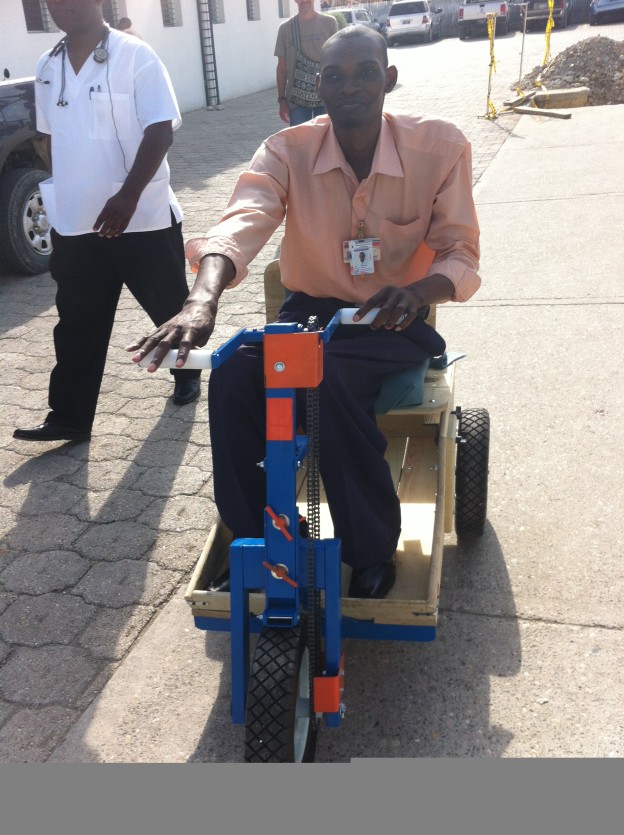Luckson lives along the main road that leads from Mirebalais, in central Haiti, through Lascahobas and on to the Dominican border. He’s in his early thirties, and lives with his father and a young niece. Back when he was in his teens, his life seemed to hold great promise. He had learned to drive, and found a job in Port au Prince that allowed him to support himself and his sister, even as he put himself through high school.
His life took a terrible turn in 2001 when he was returning after work to the home in Port au Prince that he and his sister shared. He was mugged, shot once in the back. He lost the use of his legs and has been in a wheelchair ever since.
At first, his sister took care of him, shuttling him to the medical appointments that aimed to restore some measure of him health. But her sudden death forced him to return to his parents’ home. Then his mother died and his father’s condition deteriorated. He supported the household for awhile with a job as a school teacher, but persistent back pain that may be connected to the bullet that was never removed from his body made it difficult for him to sit for long hours every day, and eventually he had to give up the work.
Luckson is a tall man, and his wheelchair was too small for his long legs. It also lacked a footrest that could hold his feet in place. So he was unable to move around on his own. He would need to hold his feet with his hands while someone else pushed the chair.
He and entire household could do nothing but live on community charity. He had friends and neighbors who would occasionally give him something – food or a little cash – but he couldn’t count on any of them. “Haitians say, ‘A goat with many masters will die in the sun,’ he explained. They all mean well, but any of them might think that one of the others would do something for me. Sometimes our household went for days with nothing at all.”
He joined CLM’s pilot program for persons with disabilities in March. When the CLM team first came around asking him questions, he wasn’t sure what to make of it. “The first time they came, the guy just said that he was doing a census.” Then he got two more visits, and started to wonder what it was all about. “I didn’t learn about the program until they invited us to the first meeting. That’s when I began to feel glad because it seemed as though someone was finally going to help me.”
Though the program has not yet officially launched, he has already seen some benefits. When CLM staff saw how his ill-fitting chair was hampering him, they helped him contact the office of the Secretary of State for the Integration of Persons with Disabilities. A trip to Port au Prince in the CLM truck was all it took for him to receive a new hand-operated cart. The cart’s wooden body holds his feet comfortably inside, while he works peddles with his hands. His experience as a driver seemed to come back to him as his quickly learned to maneuver in the cart. On the day he brought the cart home, he was able to get from the street to his house by himself for the first time since his accident 15 years ago.
But when he talks about what he thinks of the program so far, that’s not what he mentions. “My life is totally different since I joined the program. The whole staff treats me like their friend. They took down my phone number, and call me now and again just to say, ‘Hi.’ I feel as though I’m part of something. It’s really a family. And it made me see that I have reason to hope for a better life. I’m not hopeless anymore.”
Luckson already has a plan for how he will move ahead. He wants to learn to repair cellphones. He’ll be able to sell cellphone minutes and repair phones right from his chair. Right now, people where he lives in Flande to go to Mirebalais or Lascahobas if they have trouble with their phones. It will be challenging. He’ll need tools and some training. But the CLM team is committed to trying to help him make it happen. Thanks to the Digicel Foundation’s contacts within Digicel itself, we are not far from making it happen.

You uncle would be proud